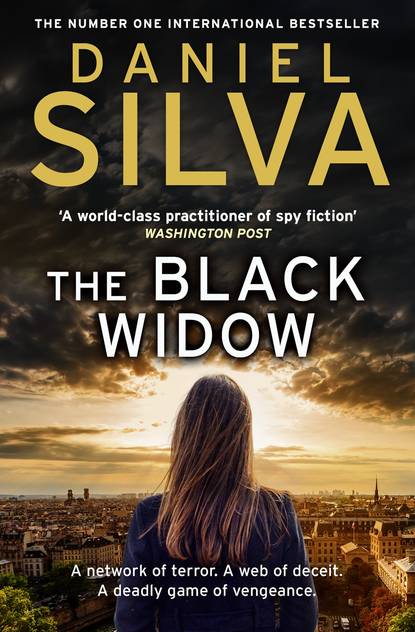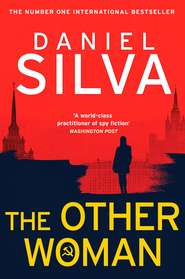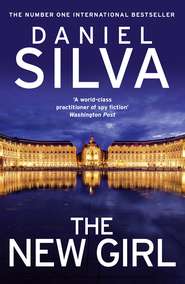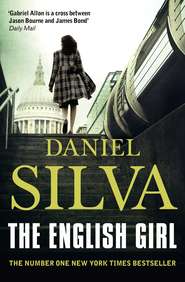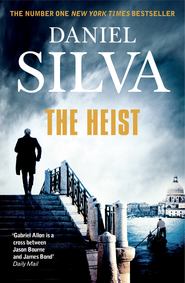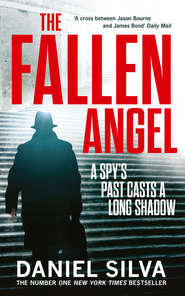По всем вопросам обращайтесь на: info@litportal.ru
(©) 2003-2024.
✖
The Black Widow
Настройки чтения
Размер шрифта
Высота строк
Поля
“Where?”
“In Washington, for example.” Rousseau set off along the embankment. “The invasion of Iraq turned the region into a cauldron. And when the new American president decided the time had come to withdraw, the cauldron boiled over. And then there was this folly we called the Arab Spring. Mubarak must go! Gaddafi must go! Assad must go!” He shook his head slowly. “It was madness, absolute madness. And now we are left with this. ISIS controls a swath of territory the size of the United Kingdom, right on the doorstep of Europe. Even Bin Laden would have never dared to dream of such a thing. And what does the American president tell us? ISIS is not Islamic. ISIS is the jayvee team.” He frowned. “What does this mean? Jayvee?”
“I think it has something to do with basketball.”
“And what does basketball have to do with a subject as serious as the rise of the caliphate?”
Gabriel only smiled.
“Does he truly believe this drivel, or is it an ignorantia affectata?”
“A willful ignorance?”
“Yes.”
“You’d have to ask him.”
“Do you know him?”
“We’ve met.”
Rousseau was obviously tempted to ask Gabriel about the circumstances of his one and only meeting with the American president, but he carried on with his lecture on ISIS instead. “The truth is,” he said, “ISIS is indeed Islamic. And it has more in common with Muhammad and his earliest followers—al salaf al salih—than some of the so-called experts care to admit. We are horrified when we read accounts of ISIS using crucifixion. We tell ourselves that these are the actions of barbarians, not men of faith. But ISIS doesn’t crucify only because it is cruel. It crucifies because, according to the Koran, crucifixion is one of the proscribed punishments for the enemies of Islam. It crucifies because it must. We civilized Westerners find this almost impossible to comprehend.”
“We don’t,” said Gabriel.
“That’s because you live in the region. You are a people of the region,” Rousseau added. “And you know full well what will happen if the likes of ISIS are ever let loose within the walls of your fortress. It will be …”
“A holocaust,” said Gabriel.
Rousseau nodded thoughtfully. Then he led Gabriel across the Pont Notre-Dame, to the Île de la Cité. “So in the words of Lenin,” he asked, “what is to be done?”
“I am merely a spy, Monsieur Rousseau, not a general or a prime minister.”
“And if you were?”
“I would tear them out root and branch. I would turn them into losers instead of winners. Take away the land,” Gabriel added, “and there can be no Islamic State. And if there is no state, the caliphate will recede once more into history.”
“Invasion didn’t work in Iraq or Afghanistan,” replied Rousseau, “and it won’t work in Syria. Better to chip away at them from the air and with the help of regional allies. In the meantime, contain the infection so it doesn’t spread to the rest of the Middle East and Europe.”
“It’s too late for that. The contagion is already here.”
They crossed another bridge, the Petit Pont, and entered the Latin Quarter. Rousseau knew it well. He walked now with a purpose other than his health, down the boulevard Saint-Germain, into a narrow side street, until finally he stopped outside the doorway of an apartment building. It was as familiar to Gabriel as the entrance of Hannah Weinberg’s building on the rue Pavée, though it had been many years since his last visit. He glanced at the intercom. Some of the names were still the same.
Presently, the door swung open and two people, a man and a woman in their mid-twenties, emerged. Rousseau caught the door before it could close and led Gabriel into the half-light of the foyer. A passageway gave onto the shadowed internal courtyard, where Rousseau paused for a second time and pointed toward a window on the uppermost floor.
“My wife and I lived right there. When she died I gave up the apartment and headed south. There were too many memories, too many ghosts.” He pointed toward a window overlooking the opposite side of the courtyard. “A former student of mine lived over there. She was quite brilliant. Quite radical, too, as were most of my students in those days. Her name,” he added, with a sidelong glance at Gabriel, “was Denise Jaubert.”
Gabriel stared without expression at Rousseau, as though the name meant nothing to him. In truth, he suspected he knew more about Denise Jaubert than did her former professor. She was indeed a radical. More important, she was the occasional lover of one Sabri al-Khalifa, leader of the Palestinian terror group Black September, mastermind of the Munich Olympics massacre.
“Late one afternoon,” Rousseau resumed, “I was working at my desk when I heard laughter in the courtyard. It was Denise. She was with a man. Black hair, pale skin, strikingly handsome. Walking a few steps behind them was a smaller fellow with short hair. I couldn’t see much of his face. You see, in spite of the overcast weather he was wearing dark glasses.”
Rousseau looked at Gabriel, but Gabriel, in his thoughts, was walking across a Parisian courtyard, a few paces behind the man for whom the Office had spent seven long years searching.
“I wasn’t the only one who noticed the man in the sunglasses,” Rousseau said after a moment. “Denise’s handsome companion noticed him, too. He tried to draw a pistol, but the smaller man drew first. I’ll never forget how he moved forward while he was firing. It was … beautiful. There were ten shots. Then he inserted a second magazine into his weapon, placed the barrel of the gun against the man’s ear, and fired one last shot. It’s odd, but I don’t recall him leaving. He just seemed to vanish.” Rousseau looked at Gabriel. “And now he stands beside me.”
Gabriel said nothing. He was staring down at the cobbles of the courtyard, the cobbles that had once run red with the blood of Sabri al-Khalifa.
“I must admit,” said Rousseau, “that for a long time I thought you a murderer. The civilized world condemned your actions. But now the civilized world finds itself in the very same fight, and we are using the very same tactics. Drones, missiles, men in black in the middle of the night.” He paused, then added, “It seems history has absolved you of your sins.”
“I committed no sins,” said Gabriel. “And I seek no absolution.”
Just then, Rousseau’s mobile chimed in his coat pocket, followed a few seconds later by Gabriel’s. Once again, it was Gabriel who drew first. It was a priority message from King Saul Boulevard. The DGSI had sent a similar message to Rousseau.
“It appears the attack on the Weinberg Center was only the beginning.” Rousseau returned the phone to his coat pocket and stared at the cobbles where Sabri al-Khalifa had fallen. “Will it end the same way for the one they call Saladin?”
“If we’re lucky.”
“How soon can you start?”
“Tonight.”
11 (#ulink_4b609465-44c3-5bf3-9f74-b7327c1da6df)
AMSTERDAM—PARIS (#ulink_4b609465-44c3-5bf3-9f74-b7327c1da6df)
LATER, IT WOULD BE DETERMINED with near certainty that the Paris and Amsterdam bombs were the lethal handiwork of the same man. Once again the mode of delivery was an ordinary white panel van, though in Amsterdam it was a Ford Transit rather than a Renault. It detonated at half past four precisely, in the center of Amsterdam’s bustling Albert Cuyp Market. The vehicle had entered the market early that morning and had remained there undetected throughout the day as thousands of shoppers strolled obliviously past through the pale spring sunshine. The driver of the van was a woman, approximately thirty years of age, blond hair, long legs, narrow hips, blue jeans, a hooded sweatshirt, a fleece vest. This was established not with the help of witnesses but with closed-circuit video surveillance cameras. Police found no one among the living who could recall seeing her.
The market, regarded as Europe’s largest, is located in the Old Side of the city. Opposing rows of stalls line the street, and behind the stalls are terraces of saddle-brown brick houses with shops and restaurants on the ground floor. Many of the vendors are from the Middle East and North Africa, a fact that several reporters and terrorism analysts were quick to point out during the first hours of the coverage. They saw it as evidence that the perpetrators were inspired by a creed other than radical Islam, though when pressed to name one, they could not. Finally, a scholar of Islam from Cambridge explained the seeming paradox. The Muslims of Amsterdam, she said, were living in a city of legalized drugs and prostitution where the laws of men held sway rather than the laws of Allah. In the eyes of the Muslim extremists, they were apostates. And the only punishment for apostasy was death.
Witnesses would recall not the thunderous bellow of the explosion but the deep, wintry silence that followed. In time, there was a moan, and a childlike sob, and the electronic pulse of a mobile phone pleading to be answered. For several minutes thick black smoke obscured the horror. Then, gradually, the smoke lifted and the devastation was revealed: the limbless and the lifeless, the sooty-faced survivors wandering dazed and partially disrobed through the debris, the shoes of a vendor scattered among the shoes of the dead. Everywhere there was split fruit and spilled blood and the aroma, suddenly nauseating, of roasted lamb seasoned with cumin and turmeric.
The claims of responsibility were not long in coming. The first was from an obscure cell in lawless Libya, followed soon after by al-Shabaab, the Somalia-based group that had terrorized East Africa. Finally, there appeared a video on a popular social media site. In it, a black-hooded man who spoke English with an East London accent declared that the attack was the work of ISIS, and that more attacks were to come. He then embarked, in a mixture of English and Arabic, on a rambling homily about the armies of Rome and a Syrian village called Dabiq. The television commentators were perplexed. The learned expert from Cambridge was not.
The reaction ranged from outrage to disbelief to smug recriminations. In Washington the American president condemned the bombing as “a wanton act of murder and barbarism,” though, curiously, he made no mention of the perpetrators’ motives or of Islam, radical or otherwise. His congressional opponents quickly laid blame for the attack squarely at his feet. Had he not precipitously withdrawn American troops from Iraq, they said, ISIS would never have taken root in neighboring Syria. The president’s spokesman later dismissed suggestions that the time had come for American ground troops to take the fight directly to ISIS. “We have a strategy,” he said. Then, with a straight face, he added, “It is working.”
In the Netherlands, however, Dutch authorities had no interest in apportioning blame, for they were far too busy searching for survivors amid the rubble, and for the woman, approximately thirty years of age, blond hair, long legs, narrow hips, blue jeans, hooded sweatshirt, fleece vest, who had driven the bomb van into the market. For two days her name remained a mystery. Then a second video appeared on the same social media Web site, narrated by the same man who spoke with an East London accent. This time, he was not alone. Two veiled women stood next to him. One remained silent, the other spoke. She identified herself as Margreet Janssen, a convert to Islam from the Dutch coastal city of Noordwijk. She had planted the bomb, she said, to punish the blasphemers and the infidels in the name of Allah and Muhammad, peace be upon him.
Later that day the AIVD, the Dutch security and intelligence service, confirmed that Margreet Janssen had traveled to Syria eighteen months previously, had remained there for approximately six months, and had been allowed to return to the Netherlands after convincing the Dutch authorities that she had renounced her ties to ISIS and the global jihadist movement. The security service placed the woman under electronic and physical surveillance, but the surveillance was subsequently dropped when she exhibited no signs of continued involvement in radical Islamic activities. Obviously, said an AIVD spokesman, it was an error in judgment.
Within minutes the cyberrooms of the digital caliphate were ablaze with excited chatter. Margreet Janssen was suddenly the new symbol of the global jihad, a former Christian from a European country who was now a lethal member of the community of believers. But who was the other woman in the video? The one who did not speak? The answer came not from Amsterdam but from a fortress-like building in the Paris suburb of Levallois-Perret. The second woman, said the chief of the DGSI, was Safia Bourihane, one of the perpetrators of the attack on the Weinberg Center.
Before terminating its surveillance of Margreet Janssen, the AIVD had assembled a dense dossier of watch reports, photographs, e-mails, text messages, and Internet browsing histories, along with secondary files on friends, family members, associates, and fellow travelers in the global jihadist movement. Paul Rousseau received a copy of the dossier during a meeting at AIVD headquarters in The Hague, and upon his return to Paris he presented it to Gabriel in a quiet brasserie on the rue de Miromesnil, in the Eighth Arrondissement. The dossier had been digitized and stored on a secure flash drive. Rousseau slid it across the table beneath a napkin, with all the discretion of a gunshot in an empty chapel. It was no matter; the brasserie was deserted except for a small bald man wearing a well-cut suit and a lavish lavender necktie. He was drinking a glass of Côtes du Rhone and reading a copy of Le Figaro. It was filled with the news from Amsterdam. Gabriel slipped the flash drive into his coat pocket, making no effort to conceal his action, and asked Rousseau about the mood at AIVD headquarters.
“Somewhere between panic and resignation,” answered Rousseau. “They’re ramping up their surveillance of known Islamic extremists and searching for the man who built the bomb and the other elements of the network.” He lowered his voice and added, “They were wondering whether I had any ideas.”
“Did you mention Saladin?”
“It might have slipped my mind,” said Rousseau with a sly smile. “But at some point we’re going to have to go on the record with our friends here in Europe.”





